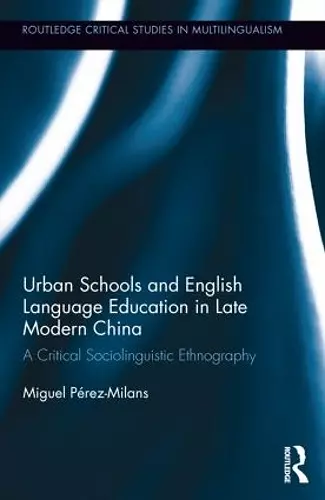Urban Schools and English Language Education in Late Modern China
A Critical Sociolinguistic Ethnography
Format:Hardback
Publisher:Taylor & Francis Ltd
Published:16th Apr '13
Currently unavailable, and unfortunately no date known when it will be back
This hardback is available in another edition too:
- Paperback£49.99(9781138942936)

Shortlisted for the 2014 BAAL Book Prize
This book explores the meaning of modernization in contemporary Chinese education. It examines the implications of the implementation of reforms in English language education for experimental-urban schools in the People’s Republic of China.
Pérez-Milans sheds light on how national, linguistic, and cultural ideologies linked to modernization are being institutionally (re)produced, legitimated, and inter-personally negotiated through everyday practice in the current context of Chinese educational reforms. He places special emphasis on those reforms regarding English language education, with respect to the economic processes of globalization that are shaping (and being shaped by) the contemporary Chinese nation-state. In particular, the book analyzes the processes of institutional categorization of the "good experimental school", the "good student", and the "appropriate knowledge" that emerge from the daily discursive organization of those schools, with special attention to the related contradictions, uncertainties and dilemmas. Thus, it provides an account of the on-going cultural processes of change faced by contemporary Chinese educational institutions under conditions of late modernity.
Winner of The University of Hong Kong's Faculty Early Career Research Output Award for outstanding book publication, by the Faculty of Education
'This book is an eye-opener for all sociolinguists interested in understanding how nation-states respond to and 'do' globalisation through language education policies. This is not a book about China, in other words. Or at least it is less about China than about how globalised institutional spaces such as schools are "key sites for the exploration of links between processes of economic transformation, changes in the organisation of a given community, and discursive practices through which that community reconstitutes itself" (p.9). It unquestionably invites us to include other Eastern schools in our understanding of these processes. But it also exhorts us to explore if and how, and with what results, Western nation-states, like China, pursue paths to political and economic modernisation that blend an increasing investment in language commodification and internationalisation with a more protective concern for linguistic and cultural heritage.' - Jürgen Jaspers, Université Libre de Bruxelles, Journal of Sociolinguistics
'The book is written in a lively narrative style employing real-life examples, especially in the description and analysis of choral practice. It constitutes a valuable addition to the current literature in the field of multilingualism and is suitable for post- graduate and PhD students of sociolinguistics and multilingual education as well as for professionals involved in educational reform and language planning.' - Li Jia, Macquarie University, Australia and Yunnan University, China, Multilingua. Journal of Cross-Cultural and Interlanguage Communication
ISBN: 9780415502221
Dimensions: unknown
Weight: 950g
208 pages